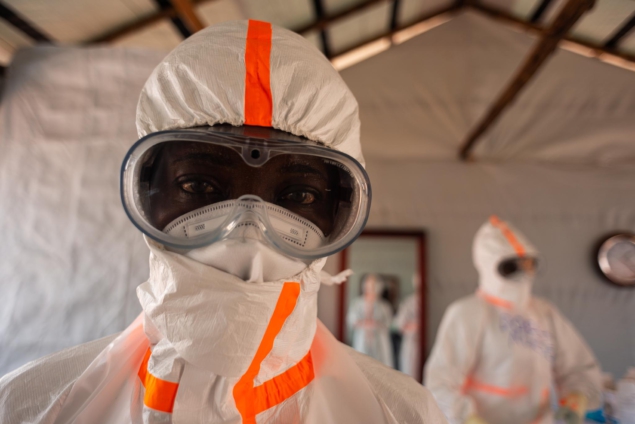Uganda's Ministry of Health has confirmed a new outbreak of the Ebola virus in the capital, Kampala, with one reported death.
The victim was a 32-year-old male nurse whose symptoms included "high fever, chest pain, and difficulty in breathing" and "bleeding from multiple body sites".
He died of multi-organ failure on Wednesday at Mulango National Hospital, located in the city's central business district.
This marks Uganda's eighth recorded Ebola outbreak since the first infection was documented in 2000.
The Sudan Ebola Virus Disease (SUDV) is a highly infectious haemorrhagic fever which is transmitted through contact with infected bodily fluids and tissues. It is one of several strains of the Ebola virus known to cause outbreaks.
In the days before his death, the nurse went to multiple health facilities as well as a traditional healer, before the diagnosis was confirmed.
He also went to a public hospital in Mbale, a city which borders Kenya.
The ministry said 44 contacts of the deceased man, including 30 healthcare workers, have been identified for tracing.
Rapid response teams have been deployed to try to contain the disease.
But contact tracing may be difficult since Kampala, a bustling city of over four million people, serves as a major hub for travel to South Sudan, Democratic Republic of Congo, Rwanda, and other neighbouring countries.
Uganda's last Ebola outbreak was in September 2022, which was also caused by SUDV. Centred in Mubende district, it was declared over after four months.
There are six known types of the Ebola virus. Four of them, Zaire, Bundibugyo, Sudan, and Taï Forest, are known to cause disease in humans.
The Reston and Bombali strains primarily affect non-human primates.
Unlike the more common Zaire Ebola virus, there is no approved vaccine for the Sudan strain.
Symptoms of Ebola infection include fever, fatigue, muscle pain, headache, and sore throat, followed by vomiting, diarrhoea, rash, and internal and external bleeding.
The World Health Organization (WHO) estimates that, on average, Ebola kills five in every 10 infected individuals.
However, past outbreaks have shown a case fatality rate ranging from 25% to 90%, depending on the circumstances and response measures.
Latest Stories
-
AfDB set for a new president, as Ould Tah gains continental endorsement
2 minutes -
Resolve trade imbalance with trust, not tariffs – Bawumia to world leaders
10 minutes -
NADMO confirms no casualties from Sunday’s heavy rains
15 minutes -
16-year-old student arrested with locally made gun
22 minutes -
Karpowership in Ghana: Delivering reliable power, driving sustainable growth
37 minutes -
Biden’s cancer diagnosis is another formidable challenge
48 minutes -
Bawumia declares ‘I was made for this’ as he leads Africa’s digital agenda at Cambridge
50 minutes -
‘Tight monetary-fiscal coordination is paying off, but may be hurting growth’ – Economist warns
58 minutes -
‘Africa’s time is now’- Bawumia inspires with digital vision at Cambridge Conference
1 hour -
‘Are we sacrificing the environment to save the cedi?’ – Prof. Bokpin quizzes BoG’s gold strategy
1 hour -
Bawumia’s Cambridge speech makes the case for digital Africa
2 hours -
‘Why is a board member doing PR?’ – Ken Thompson on Adongo’s dollar withdrawal comments
2 hours -
‘We should be building reserves, not playing with rates’ – Prof. Bokpin warns of BoG currency strategy
2 hours -
‘This strengthening of the cedi risks undermining local production,’ says Prof Bokpin
3 hours -
‘Cedi’s rally isn’t a blip, but it’s not sustainable,’ says Prof Bokpin
4 hours

